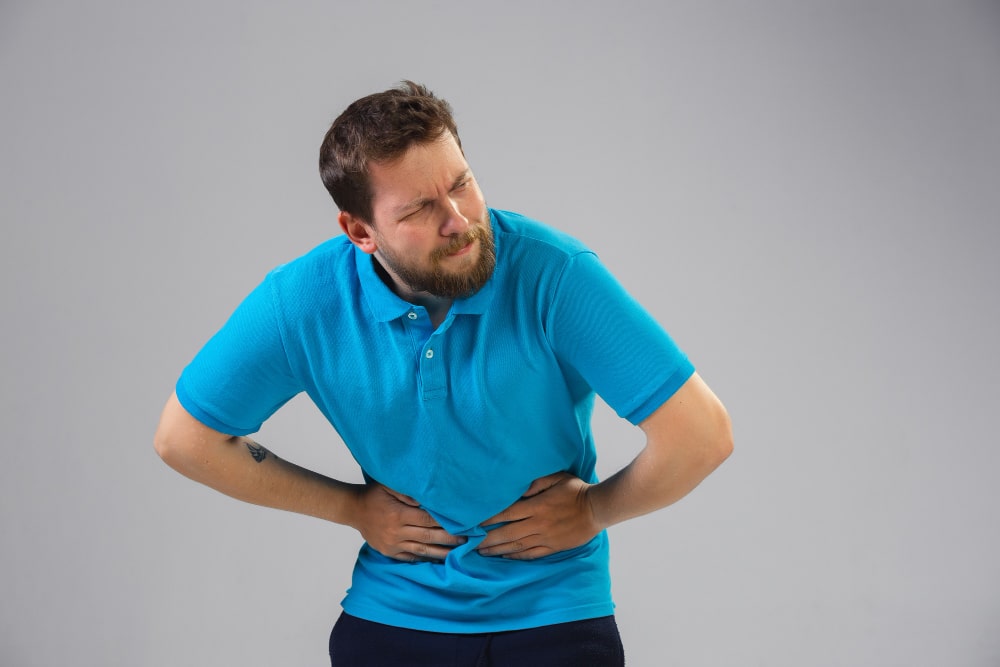Living with hernia pain can be difficult and uncomfortable. A hernia occurs when part of an internal organ or tissue bulges out through a weak area of muscle. Fortunately, there are multiple ways to relieve the pain caused by a hernia. This article discusses common types of hernias, their causes, and the treatment options available to help relieve hernia pain. We’ll also include some self-care strategies to manage hernia pain in the comfort of your home. Read on to learn more about how to relieve hernia pain.
What is Hernia?
When an internal organ—such as the bowel or bladder—protrudes through a weak spot in the surrounding muscle wall, the condition is called a hernia. Hernias can occur anywhere on the body, but the abdomen, groin, and upper thighs are the most common places for them to occur. In addition, hernias can either be present at birth or develop later in life due to increased stress on weak parts of the abdominal wall.
Read More: Burning Pain in Knee: What Causes It and How to Relief
Signs and Symptoms of Hernia
Common signs and symptoms of a hernia include:
- Swelling or bulging in the affected area;
- Pain or feeling of heaviness;
- Difficulty urinating or having a bowel movement;
- Burning or gurgling sensation in the affected area;
- Increased pain with physical activity, coughing, standing for long periods of time, or lifting heavy objects.
Common Causes of Hernia Pain
Hernias are often caused by weakened abdominal muscles that cannot properly support the organs. This can be due to several factors such as obesity, pregnancy, straining during urination or bowel movements, lifting heavy objects, persistent coughing or sneezing, and aging. Additionally, hernias may also occur after surgery due to increased pressure on the weakened area of the abdominal wall.
Types of Hernias
There are several different types of hernias, including
Inguinal (groin) Hernias: occur when the intestines or other organs protrude through a weakened area in the lower abdominal wall, usually near the groin.
Femoral (thigh) hernias: occur when the intestine or organ protrudes through a weakened area in the upper thigh, near the inguinal canal.
Hiatal (umbilical) hernias: occur when part of the stomach pushes through a weakened area in the diaphragm near the belly button.
Incisional and Spigelian hernias: occur when an organ or intestine protrudes through a weakened area near a surgical incision or along the abdominal wall.


Read More: Forearm Muscle Pain: What Causes It and How to Find Relief
How to Relieve Hernia Pain? Treatment Options
The treatment for hernia pain depends on the type of hernia, its severity, and the individual’s health history. Treatment options may include:
1) Medication
In some cases, doctors may prescribe medications to relieve hernia pain. Commonly prescribed medications are pain relievers, such as ibuprofen or acetaminophen. These drugs are muscle relaxants and antibiotics to treat hernia infections. For more severe pain, include topical anesthetics.
2) Physical Activity and Exercise
Light physical activity and exercise can help reduce hernia pain. However, it’s best to avoid activities that strain the weakened muscle wall excessively or increase pressure in the abdomen. Therefore, activities such as heavy lifting and high-impact sports should be avoided.
3) Dietary Changes
Making dietary changes can help reduce the pain and discomfort of a hernia. It can also help prevent the hernia from getting worse. You must eat a healthy, balanced diet low in fat and fiber. Drinking plenty of fluids can help prevent constipation. And it can reduce hernia pain.
Read More: Stomach Pain After Sex: Causes, Symptoms, and Remedies
4) Weight Loss and Lifestyle Modifications
If you are overweight or obese, losing weight can reduce hernia pain. Lifestyle adjustments such as quitting smoking, avoiding alcohol and caffeine, and reducing stress are also important.
5) Surgical Treatments for Hernia Pain Relief
In some cases, surgery may be necessary to relieve hernia pain. Types of surgical treatments include laparoscopic surgery or open surgery.
Laparoscopic surgery is a minimally invasive procedure in which the surgeon makes a small incision in the abdomen and inserts tiny tools and cameras to repair the hernia.
Open surgery is an older, more invasive technique that requires larger incisions for the surgeon to repair the hernia. Both procedures can relieve hernia pain, but laparoscopic surgery may cause less pain and recovery time.
Read More: Sharp Pain in Vagina: Causes, Symptoms, and Treatment
Self-Care Strategies for Relieving Hernia Pain
In addition to medical treatments, a variety of self-care strategies can be used to help manage and relieve hernia pain. These include:
1) Over-the-Counter Medications
When over-the-counter medications are taken as directed, they can help reduce discomfort and pain associated with hernias. Commonly recommended medicines include ibuprofen or acetaminophen.
2) Hot and Cold Compresses
Applying hot or cold compresses to the affected area can help relieve hernia pain. Generally, heat increases blood flow and relaxes muscles, while cold compresses reduce inflammation.
3) Proper Posture
Maintaining good posture can help reduce hernia pain. This includes avoiding slouching, standing up straight with your shoulders back, keeping your knees slightly bent when sitting, avoiding lifting heavy objects, and taking frequent breaks throughout the day.
Read More: Can Gallbladder Cause Back Pain: Causes, Symptoms, Cure
4) Gentle Exercise
Gentle exercises like walking or swimming can help reduce hernia pain and prevent further complications. However, it’s important to avoid activities that put excessive strain on the affected area.
Exercises, such as walking or swimming, can help reduce hernia pain and prevent further complications. However, it’s important to avoid activities that put excessive strain on the affected area.
5) Healthy Diet


Eating a healthy diet is essential for managing hernia pain. This includes eating plenty of fiber-rich foods and avoiding foods that are high in fat and sugar. Additionally, drinking plenty of fluids can help prevent constipation, which can worsen hernia pain.
6) Home Remedies and Herbal Medicine
Some people find relief from hernia pain by using home remedies such as ginger or chamomile tea, garlic paste, and Epsom salt baths. Additionally, some people may benefit from taking herbal medicines such as turmeric or fennel. However, it’s important to speak with your doctor before taking any herbal medications.
Bottom line:
Finally, hernia pain can be managed with a combination of medical treatment, self-care strategies, and lifestyle changes. It is best to consult a doctor before using any herb. Eat a healthy diet, exercise regularly, and avoid activities that put pressure on the weak abdominal wall. Maintain your posture. By following these steps, you can get rid of this pain. If these measures do not provide relief, then proper treatment is necessary. With self-care strategies, hernia pain can be alleviated.
Read More: Diarrhea While Breastfeeding: Causes, Remedies, Precautions
FAQs
A. Common treatments for hernia pain include drug therapy, physical activity and exercise, dietary changes, weight loss, lifestyle changes, or surgical treatment.
A. Home remedies such as ginger or chamomile tea, garlic paste, and Epsom salt baths are beneficial for relieving hernia pain. Some people may benefit from taking herbal remedies such as turmeric or fennel. However, it is important to talk to your doctor before taking any herbal medicines.
A. avoid activities that stress the weak muscle wall or increase abdominal pressure. This includes heavy lifting and high-impact sports, such as running and jumping. In addition, other lifestyle changes may be beneficial, such as quitting smoking, avoiding alcohol and caffeine, and reducing stress.
A. If your hernia pain is accompanied by nausea, vomiting, fever, difficulty breathing, or severe abdominal pain, you should seek immediate medical attention. If your hernia pain doesn’t improve with self-care strategies or long-term medication, it’s important to talk to your doctor about other treatment options.
A. Common surgical treatments for hernia pain include laparoscopic and open surgery. Laparoscopic surgery is less invasive, while open surgery requires the surgeon to make a larger incision to repair the hernia. Both procedures can relieve hernia pain, but laparoscopic surgery may cause less pain and recovery time.

